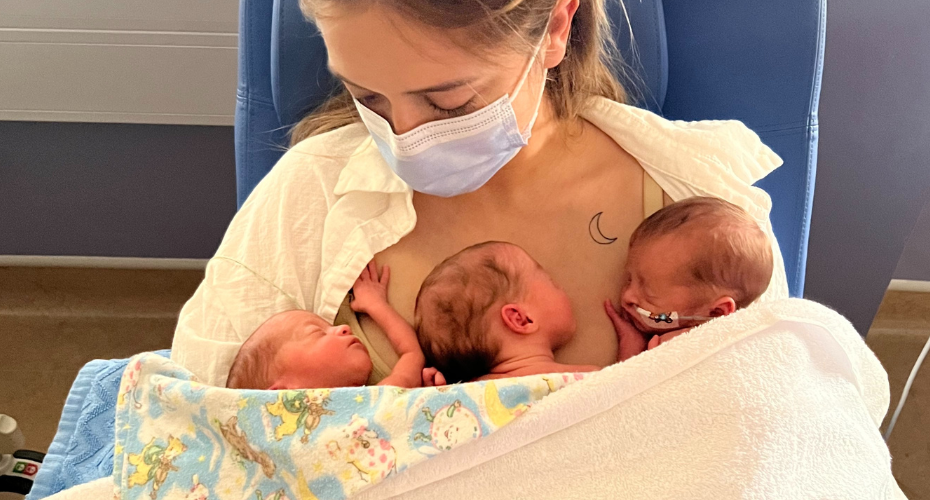Caring for your baby
All parents are encouraged to spend as much time as possible with their baby in the unit. Staff members are always available to answer any questions you may have in relation to your baby’s condition.
Parenting a baby can sometimes be an overwhelming experience. It is normal to feel frightened or helpless about the things that you cannot yet do for your baby.
There is no one more important to your baby than you.
We are here to help and support you. Please feel free to ask any questions or express any fears or concerns you may have. Talk to your baby’s nurse or doctor if you need something.
Clothes, Nappies and Wipes
You are asked to provide nappies and wipes for your baby in the neonatal unit.
Thanks to the kind donations of other babies & parents, we have a selection of “premmie” clothes that we use on the unit. As soon as your baby is able to be dressed, we will use these clothes. Hospital clothes will be washed in the hospital laundry.
We would ask that you have one set of clothes for your baby including a vest, baby-grow and socks. When using your own baby clothes, however please ensure that you take any soiled clothes home for washing regularly.
Breastmilk
Breast milk is important for all babies but even more important if your baby is premature. Mums should try to express milk by hand expressions in the first 24 hours after birth. A breast pump can be used after this time. A comprehensive leaflet is available to advise you on this from your Neonatal Nurse or the Hospital Lactation Consultants.
Learning Your Baby’s Language
Your baby is now in a world that can be overwhelming at times, due to light, noise and handling. Each baby is individual and has different levels of tolerance, depending on their age, gestation and health. We practice Individualised Baby Led Care in our unit, and try to adjust our environment and cares to each baby. We reduce their stress by being conscious of the noise and light levels in the unit. We also try to reduce babies stress by supporting babies with boundaries in their cot/incubator, non-nutritive sucking and most importantly by being with you.
Babies often do not like being over stimulated. Rest and sleep are very important things to your baby’s growth & development.
Babies will try to tell us when they have had enough. They become restless, arch their backs, yawn, spread out their hands, gag/spit their milk, hiccup, look away, become pale or their vital signs can become un- stable. We will work in partnership with you in caring for your baby/babies to help you understand your baby’s cues and how to respond to them.
Kangaroo Care
Kangaroo care is skin-to-skin contact with your baby. It has many benefits for both your baby and you, e.g. better weight gain, less breathing support, better quality sleep for growth and development, improved bonding, increased milk supply and helps parents relax.

However, it is essential for your baby that this is carried out safely. This is achieved by safe transfer from the cot/incubator to the parent and the positioning of the baby. Your nurse will ensure that this occurs. Your baby will continue to be monitored continuously whilst in this position. If at any time your nurse has any concerns for your baby, he/she will be returned to their cot/incubator and assessed.
We would ask you to wear a top that opens down the front, and allow at least 1 hour for holding your baby to get the most benefit. On occasion, your baby may not be able to come out for kangaroo care. We are always led by your baby’s condition, but there are other ways to help your baby until they are able to come out for kangaroo care, such as containment holding.
For kangaroo care we would ask that your skin is clean, you have had a shower and if you are a smoker you would not have smoked before coming to the NNU.
Containment Holding and Nesting For Premature Babies
Containment holding is “still touch” rather than stroking, which can be too stimulating for your baby. Babies love boundaries. They had the security of the womb each time they stretched out their legs or arms. This is why we now support your baby in their incubator with a nest, to continue this security. You can also contain your baby’s legs and arms with your hands. Your baby’s nurse/ midwife will show you how.
Knowing Me, Knowing You
Research suggests that a premature baby knows when its parents are around and can recognise their voices & scent. Your voice can be a source of comfort & security to your baby. Baby can also feel more secure and stable if they have something with your scent on it with them in the incubator. It is best though, to avoid cigarette smoke, wearing strong perfumes or aftershaves, as these will overwhelm your baby’s delicate nose.
Non-Nutritive Sucking
Babies use sucking as a comfort or support. This is known as non-nutritive sucking. Sucking helps babies learn to coordinate their breathing, as well as stimulating their sucking ability and comforting them. This is why we offer your baby a pacifier or soother.

